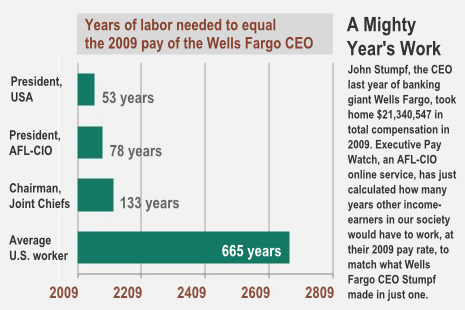Research in the News? Comments? Observations?
Category Archives: Uncategorized
Homer Simpson–The Best
A survey by Entertainment Weekly magazine named Homer Simpson the greatest character created for film or television during the past 20 years, beating out Harry Potter.
To the Oxford English Dictionary, Homer Simpson is the immortal utterer of the word, “d’oh!” To the people of Britain, Homer Simpson is the “greatest American” – the fictional character they would most like to see become president of the United States.
No information about the survey. Still, this cartoon has been around for forever it seems–so it must still have great appeal to both adults and children.
June Open Thread
Research in the News
CEO Pay Too Much?
Here is an interesting analysis and chart prepared by the Too Much , Institute for Policy Studies. What do you think?
Would Smaller Classes Increase Academic Achievement?
Maybe it is cooking (see Oliver post below)—but maybe it is smaller classes that make a difference in academic achievement in our schools. Opinions abound, of course, so what can we learn from the research?
I came across a study by Krueger and Whitmore (2001) that looked at the results of the Tennessee’s Project STAR.[1] This was, at least at that time, the only large-scale randomized experiment ever to measure the effects of class size. In this experiment, 11,600 elementary students and their teachers were randomly assigned to small classes (13-17 students), regular-size classes (22-25 students), or regular-size classes with a teachers-aide. The experiment began in 1985 when students entered kindergarten and lasted through the 3rd grade. After 3rd grade, they returned to regular-size classes. The researchers looked to see if there are discernable impacts in the 8th grade testing as well as scores on ACT or SATs taken in high school.
Their bottom-line conclusion was that small classes did increase test scores, that it increased test scores more for black children than for white children, and those effects were still evident in later grades, although not nearly as great as they were in the earlier grades. Given their results, the writers conclude: “If all students were assigned to a small class, the black-white gap in taking a college entrance exam would fall by an estimated 60 percent.” (see http://www.irs.princeton.edu/pubs/pdfs/451.pdf) Continue reading
Values
Pretending that something doesn’t exist if it’s hard to measure leads to faulty models. You’ve already seen the system trap that comes from setting goals around what is easily measured, rather than around what is important….Don’t be stopped by the ‘if you can’t define and measure it, I don’t have to pay attention to it’ ploy. No one can define or measure justice, democracy, security, freedom, truth, or love. No one can define or measure any value. But if no one speaks up for them, if systems aren’t designed to produce them, if we don’t speak about them and point toward their presence or absence, they will cease to exist.”
Donella H. Meadows, Thinking in Systems: A Primer, 2008. pp. 176-177
PEW: What’s Your Political News IQ?
Take the Quiz
To test your knowledge online canadian pharmacy of prominent people and major events in the news, we invite you to take our short 12-question quiz. Then see how you did in comparison with 1,003 randomly sampled adults asked the same questions in a January 14-17, 2010 national survey conducted by the Pew Research Center for the People & the Press. The Pew Research Center updates the News IQ quiz every few months by conducting a nationwide survey of Americans reached by both landline and cell phones. Each version of the quiz asks a wide range of questions about current events and issues as well as background facts and concepts that are relevant to the news. For an analysis of the findings from the most recent national News IQ survey, read the full summary of findings. (No peeking! If you are going to take the quiz, do it first before reading the analysis.) The exact same quiz administered on the telephone survey is replicated here on the website. When you finish, you will be able to compare your News IQ with: the average American, as well viagrageneric-edtop.com as with the scores of men and women; with college graduates as well as those who didn’t attend college; with people who are your age as well as with younger http://pharmacycanada-rxedtop.com/ and older Americans. Are you more news-savvy than the average American? Here’s cialis soft your chance to find out. The full reports from earlier viagra effects sperm versions of the quiz are also available (See October 2009, April 2009, December 2008, February 2008, September 2007 and April 2007). The April 2007 report also includes an analysis of how knowledge levels vary according to people’s news sources. weblink: http://pewresearch.org/politicalquiz/
“Poll: Less Americans Believe in Global Warming”
Democracy Now! led with that headline on November 25, 2009. It was a variant of the Washington Post’s “Fewer Americans believe in global warming, poll shows.”
As written, some people might assume that that less Americans believe in global warming as compared to those who do not believe in global warming.
The Christian Science Monitor reporting the same polling data led with this headline: “Global warming: 72 percent of Americans say it’s real, poll finds.”
Does this give you a different picture of the polling results? Which headline do you think is a more accurate portrayal of the data results?
Headlines may reflect possible spin—a way to tell the story in a way to meet a particular policy agenda. Sometimes, however, the media is trying to grab our attention. Other times the headline gets distorted when the English language is crammed into a soundbite. The first two stories wanted to make the apparent decline in global warming belief the story although readers would not know that unless they read the story. The Washington Post’s lead paragraph was:
“The percentage of Americans who believe global warming is happening has dipped from 80 to 72 percent in the past year, according to a new Washington Post-ABC News poll, even as a majority still support a national cap on greenhouse gas emissions.”
They are trying to make this a story with some drama and mystery—but if 72% of the people believe that global warming is happening, then it should be no surprise that a majority would favor a national cap on greenhouse gas emissions (assuming they believe that the gas emissions are a contributing factor in global warming).
What are the key questions sophisticated users should be asking?

